Dietetics - making strides
The Dietetics Department is only three years old but very proud of its first students who are expected to graduate in 2016.
The four-year degree is one of several new degrees that has been introduced, as part of Nelson Mandela Metropolitan University’s commitment, to meet a growing national need in providing health care professionals.
Lecturer Phumeza Mkontwana says there is currently a shift from the majority of dieticians in private practice towards the public sector and industry with the added advantages of a stable income.
She says dieticians are needed in community health, school nutrition, to inform policy formation and the various other public sectors where the scientific back-up behind food choices is needed.
Even in the fast-food sector, dieticians are needed to emphasise healthier choices on the menus towards a healthier generation.
She says their motto is “food first” - inspiring people to first choose healthy food before reaching for medication.
Dieticians now also complete a one-year paid internship in the public sector.
The Department of Nursing Science - looking back over ten years
In the last 10 years, the student numbers in the Department of Nursing Science have grown substantially. In 2015, the undergraduate nursing programme had 493 enrolments. In addition, the Department of Nursing Science has enrolled 288 postgraduate students to date. In the last 10 years 53 nurses were awarded their masters degrees and 14 nurses were awarded their doctoral degrees in nursing science. From humble beginnings the number of staff members in the department has also grown to more than 30 (lecturers and administrative staff), and more than half of the full time lecturing staff hold doctoral degrees.
In 2007, the department embarked on a project to increase the access of students into the nursing programme and started the Bachelor of Nursing Science Extended Programme. The programme was specifically designed to enable students who were passionate about pursuing nursing as a profession, but who did not meet the requirements for direct admission to university. Essentially the first year is extended over two years and students are given extra support where contact time is extended and modules are offered to enable them to adapt to university academic life. The programme has been a major success and has resulted in the number of nursing students doubling, with the in-take of students admitted to the extended programme exceeding those in the mainstream programme.
Over the last decade the Department of Nursing Science has also grown in terms of establishing clinical simulation laboratories. Starting with just a two-bed clinical simulation laboratory, the department now has seven fully equipped simulation laboratories, ranging from low to high fidelity simulation approaches. Nationally, our clinical simulation laboratories have been used as a benchmark for other nursing education institutions. The Department of Nursing Science is currently the only national provider of training for clinical laboratory managers at various national platforms. The unique simulation approaches and state of the art equipment are a definite competitive advantage to the Department of Nursing Science. The simulation footprint has been extended into the SADC countries as NMMU provides simulation training to health care professionals in countries such as Zambia and the Democratic Republic of Congo.
In South Africa, the Department of Nursing Science has formed numerous collaborative partnerships. For the past decade we have had a partnership with Life Healthcare College of Learning and operate as the moderating body for teaching and learning, and quality standards at this institution. Various projects have been undertaken over the last decade in empowering and capacitating nursing education in the public nursing college, Lilitha College of Nursing, in the Eastern Cape. Some of these projects have been supported with funding from the Atlantic Philanthropy funding agency. Among these various projects, we have for instance, successfully trained nearly 60 new nurse educators for Limpopo and the Eastern Cape Provinces. Furthermore, we were one of the first universities in the country that established a collaborative partnership with the Nelson Mandela Children Hospital Trust in providing training to health care professionals at various platforms and areas of specialisation.
Other national initiatives include associations and collaborations with organisations such as the Nursing Education Association (NEA), the Forum for University Nursing Deans in South Africa (FUNDISA), Academy of Nursing in South Africa (ANSA) and the Wound Healing Association of South Africa (WHASA). Our community engagement is valued as there has been an increasing request over the last decade to place our nursing students on the Phelophepa train, which travels deep into the rural parts of South Africa to assist with clinical assessment, diagnosis and treatment of patients. The department is evolving in the area of community engagement and will launch the first mobile clinical laboratory, where transdisciplinary service rendering will take place.
The Department of Nursing Science has also increased its international collaboration over the last decade. Various staff members in the department, in collaboration with the University of Gothenburg in Sweden, have been involved with a multi-disciplinary research project related to mental health that has generated various research outputs. The department is also hosting short exhange study abroad programmes, for students and faculty members from nine different universities in Scandinavia, Germany and the USA. Trans-disciplinary research projects are also underway in which our post-doctoral colleagues and visiting Fulbright fellows play a pivotal role. We have been involved in the delivery of specialised training in MaxHealth Care, India, of which the first cohort of 45 specialised nurses graduated in 2014. The interest from developing countries to establish collaborative partnerships with the Department of Nursing Science has grown over the last decade.
We are proud to have touched the lives of thousands of patients through our students, and we are even more proud of the wonderful nurses that we have helped train and develop to become caring, committed top quality nurses with a high work ethic and moral integrity. We stand for excellence in nursing, and will continue to take the lead by introducing innovative and ground breaking teaching and learning interventions in future.
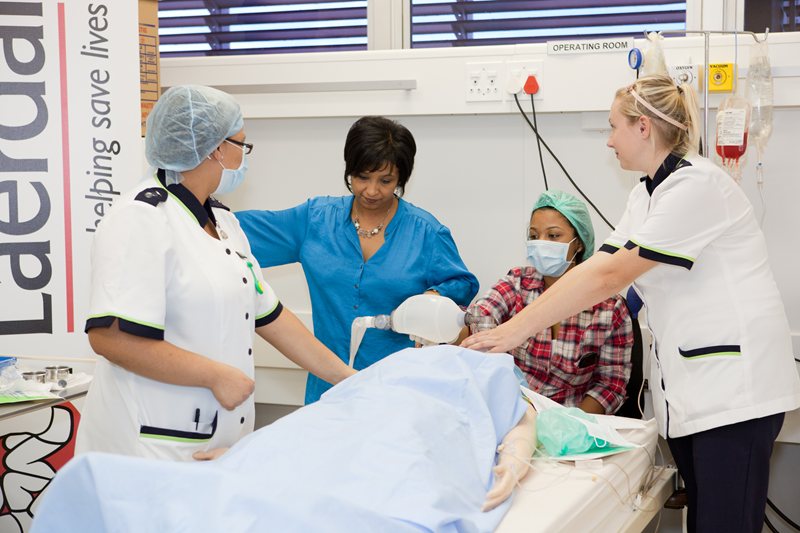
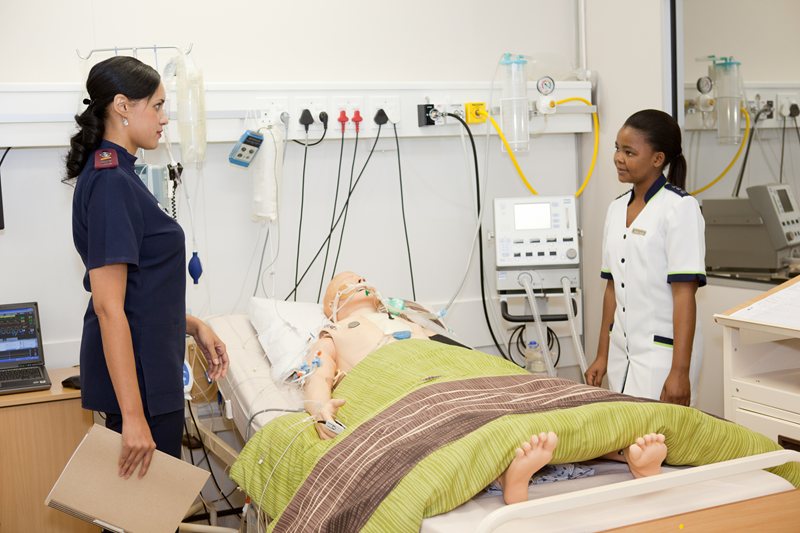
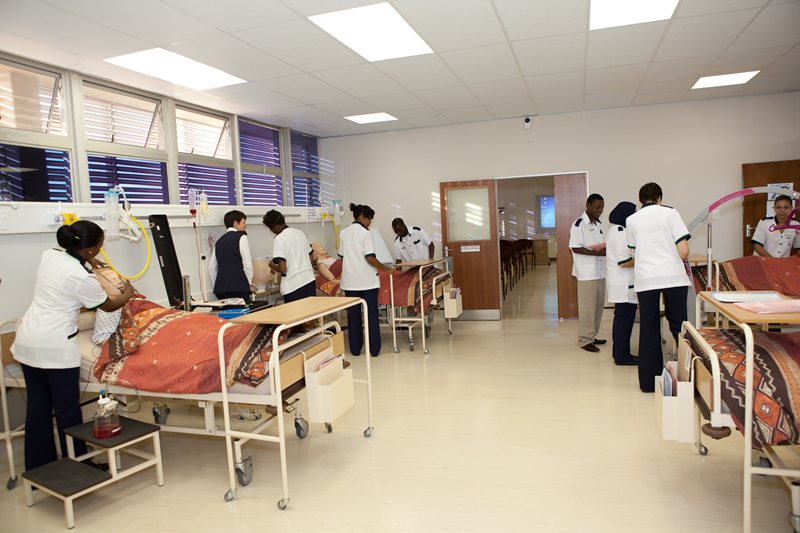
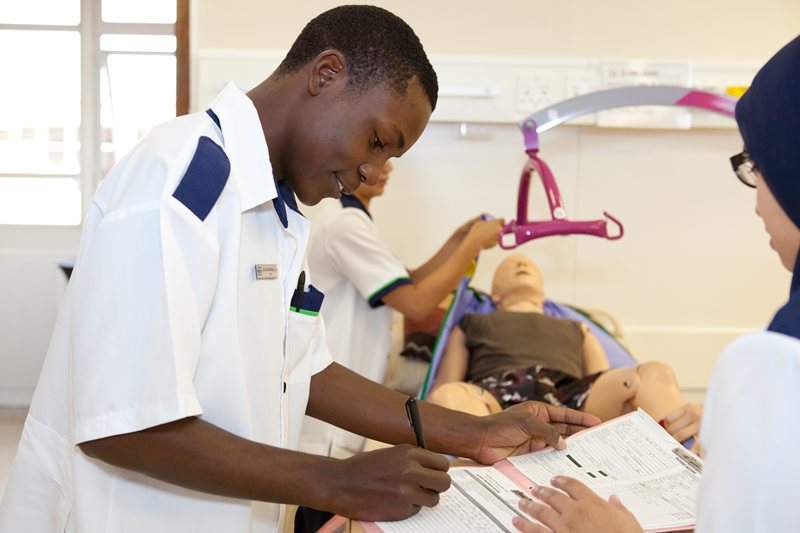
"40 years, 40 nurses” exhibition celebrates landmark anniversary
THIS year, Nelson Mandela Metropolitan University’s Department of Nursing Science turns 40 – and is celebrating the occasion with an exhibition which tells the life stories of 40 devoted nursing graduates, many of whom maintain strong links with the university.
NMMU itself turns 10 this year, but its history goes back much further, as it was formed in 2005 from a merging of the former University of Port Elizabeth (UPE), Port Elizabeth Technikon and Vista University’s Port Elizabeth campus. The Department of Nursing Science was established in 1975 at UPE.
The “40 years, 40 nurses” exhibition features attractive ceiling-high panels, which pay homage to the nurses, outlining where they came from, why they chose nursing, where their careers have taken them, and how they have made an impact, locally, nationally and internationally. It was launched in February and was open to the public for two months.
Among the 40 are nursing stalwarts like Prof Nita Strumpher, who has spent 37 years teaching at the university. Ironically, she chose to study nursing on a whim, following friends who were planning to do the same, but soon discovered nursing was her calling in life.
Some of the nurses profiled have made history, like Dr Jill von der Marwitz, who was instrumental in establishing South Africa’s first on-campus Anti-retroviral (ARV) Clinic, at NMMU. There is also Prof (Firstname?) Rautenbach, who was the first male nurse in the country to obtain a Doctorate in Nursing.
Some nurses have emigrated or worked elsewhere temporarily, blazing a trail of success in other countries, like Prof Cheryl Benn, who has headed up various programmes and committees in New Zealand, including being appointed to the Nursing Council of New Zealand by the former Minister of Health.
Also in the mix is current Head of Department Prof Esmeralda Ricks, who is passionate about researching how mobile technology can be used to enhance community nursing, along with past head Prof Dalena van Rooyen, who is now director of NMMU’s School of Clinical Care Science, and part of the team working towards NMMU’s goal of building a medical school by 2020.
“We are proud to have touched the lives of hundreds of students over the past 40 years, helping them develop into top quality nurses, with a high work ethic and moral integrity,” said Ricks.
The department has indeed come a long way since it first opened in its doors in 1975, with just six undergraduate and 18 postgraduate students. Last year, there were 456 undergraduates and 279 postgraduates.
Many are attracted by the department’s world-class simulation laboratories, which house state-of-the-art equipment for the various nursing disciplines, enabling students to practise their clinical skills in a safe environment, before working with patients. NMMU has conducted simulation training workshops throughout South Africa and in Zambia and the Democratic Republic of Congo.
The department has strong international ties with the United States, Norway, Sweden and India, and plays an active role in the various national nursing bodies.
At a local level, commu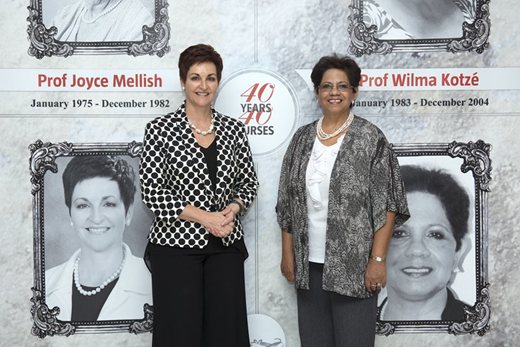 nity engagement is a priority. Staff members are involved in the training of nursing educators at Lilitha College of Nursing, and selected undergraduates assist on the Phelophepa train, which provides primary health care deep in deep rural areas.
nity engagement is a priority. Staff members are involved in the training of nursing educators at Lilitha College of Nursing, and selected undergraduates assist on the Phelophepa train, which provides primary health care deep in deep rural areas.
“NMMU’s Department of Nursing has made an impact on health care education in general, and nursing science in particular, at a global, national and local level,” said Ricks.
“We desire to continue to grow in excellence and build on our strengths, all the time seeking to be innovative and visionary in our teaching, engagement and research.”
Former NMMU Nursing Science Department head Prof Dalena van Rooyen and current head Prof Essie Ricks at the exhibition.